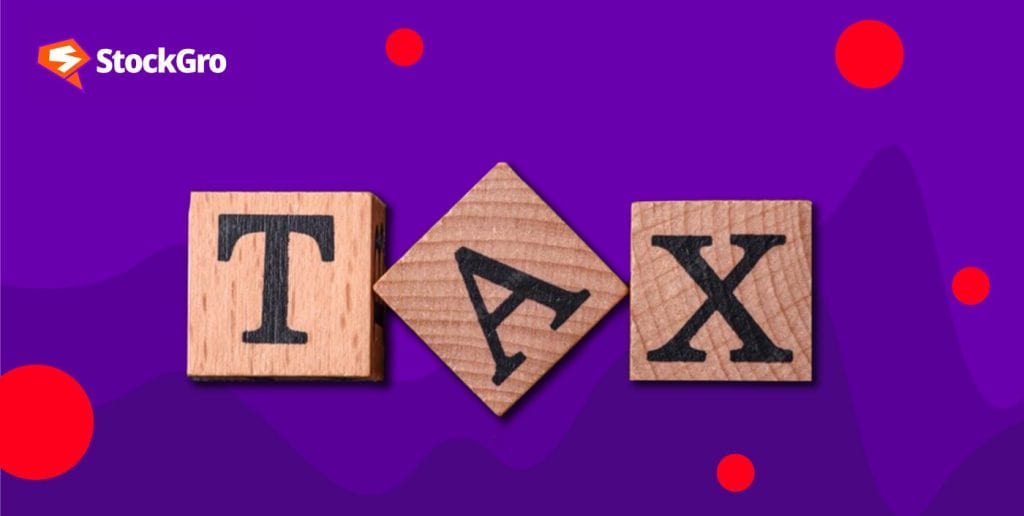
The central government has received ₹4.62 trillion in direct tax revenue so far this financial year (as of 17.06.2024). Out of this, ₹2.81 trillion came from personal income tax. This amount includes money collected from the Securities Transaction Tax (STT).
What exactly is STT? Keep reading to understand the security transaction tax meaning.
What is security transaction tax?
STT is a direct tax charged on purchasing and sale of stocks and other securities. It was introduced in 2004 to make tax collection on market transactions easier and to reduce tax fraud. The transaction duty is charged on transactions done through recognised stock exchanges.
When you buy or sell stocks, derivatives, or mutual fund units, you pay STT. The levy applies whether you make a profit or a loss on the trade. Consequently, every time you trade, you pay a little extra because of STT. It makes each transaction slightly pricier.
The government decides the STT rates and can change them over time. Bourses, mutual funds, or merchant bankers collect this tax. By the seventh of the subsequent month, the proceeds must be remitted to the state. If they don’t, they can face penalties and interest charges.
You may also like: How section 112A of Income Tax Act can boost your long term capital gains?
How does security transaction tax in India work?
STT security transaction tax works like TDS or TCS ( Tax deducted or tax collected at source). It was set to replace the older stamp duty system.
Taxes are taken out automatically when you trade securities. The buyer and the seller, being the parties to the transaction, split the toll. The rate of tax varies based on the items you trade. The security transaction tax rate, for equity shares, for instance, is 0.1% of the transaction amount.
Now, how is securities transaction tax calculated? Say you are buying stocks worth ₹1k, then ₹1 (1000* 0.1%) will be deducted.
Subsequently, the proceeds will be transferred to the state through the Reserve Bank of India, State Bank of India, or any other permitted banking third party.
The transaction duty applies to all trades on recognised stock exchanges. It also includes off-market trades and some foreign exchanges. STT’s number one aim is to bring in income for the government. It also helps reduce excessive speculative trading by making it more expensive.
Also read:Section 194IB – TDS on rent under Section 194IB of Income Tax Act
Types of transactions subject to STT
The STT levy applies to different kinds of securities traded on recognized bourses. Please note that the “securities” is not explicitly defined within the Securities Transaction Tax Rules of 2004 itself. However, here are the main types of transactions subject to STT:
- Equity shares and stocks: STT is levied on the buying and selling of equity shares and stocks on recognized exchanges like BSE and NSE.
- Derivatives: Futures and options contracts incur STT, typically when they are sold.
- Mutual funds: Equity-oriented funds get STT during purchase or sale.
- Securitized debt instruments: Trading of securitized debt instruments faces taxation.
- Government securities: STT applies to government securities of an equity nature.
- Collective investment schemes: Units or instruments issued by collective investment schemes incur STT when traded.
- Rights or interests in securities: Rights shares, bonus shares, and other interests in securities are subject to STT when traded on stock exchanges.
Security transaction tax rate
To answer the most common question, “How much is security transaction tax?” Here is the table. These are the recent levies from April 1, 2023.
| Security | STT rate (%) | Payer | Basis for STT Calculation |
| Purchase of equity share/unit of business trust | 0.1 | Purchaser | Volume weighted average price |
| Purchase of equity oriented fund unit | NIL | NIL | NA |
| Sale of equity share/unit of business trust | 0.1 | Seller | Volume weighted average price |
| Sale of equity oriented fund unit | 0.001 | Seller | Volume weighted average price |
| Sale of equity share/unit (non-delivery) | 0.025 | Seller | Volume weighted average price |
| Sale of option in securities | 0.0625 | Seller | Option premium |
| Sale of exercised option | 0.125 | Purchaser | Intrinsic value (post-01.09.2019) / Settlement price (pre-01.09.2019) |
| Sale of futures in securities | 0.0125 | Seller | Traded price |
Usually, derivative contracts are settled in cash, and the STT is 0.001%. However, in April 2018, SEBI listed 46 stocks for physical delivery instead of cash. At first, stock exchanges charged 0.1% STT for these transactions.
This led to a petition by the Association of National Exchange Members of India or ANMI. The Bombay High Court asked the Central Board of Direct Taxes for clarification. In August, 2018, the central board clarified that the 0.1% STT rate for delivery-based equity transactions also applies to these physically settled derivative contracts.
Also read: How much tax do you pay on stock market gains?
Bottomline
We hope you now are aware of the securities transaction tax definition. This direct tax simplifies tax collection and helps curb speculative trading. By understanding STT rates and applicable transactions, investors can better manage their trading costs and comply with tax regulations.
FAQs
- How is STT calculated?
STT, or Securities Transaction Tax, is calculated based on the value of your trade. For example, if you buy or sell stocks worth ₹1,000, the STT rate for equity shares is 0.1%. So, you’d pay ₹1 as STT (₹1,000 * 0.1%). The rate can vary for different securities like mutual funds or derivatives. It’s automatically deducted by the stock exchange during the trade.
- What is the security transaction tax in India?
It’s a transaction tax for trading securities. This rule is to make collection easier and reduce tax fraud. When you trade stocks, mutual funds, or derivatives, you pay the duty. The rate varies depending on what you’re trading. It’s automatically deducted during the trade.
- How can I avoid STT charges?
You can’t completely avoid STT charges as they’re mandatory for trades on recognised stock exchanges in India. However, you can minimise them by trading less frequently or choosing investments like mutual funds with lower STT rates. Also, consider long-term investments over short-term trades. This way, you’ll pay STT less often. Always check STT rates for different securities before trading.
- What is the STT charge percentage?
The STT charge percentage depends on what you’re trading. For buying or selling stocks, it’s 0.1 per cent. For selling equity mutual fund units, it’s 0.001%, and for futures, it’s 0.0125%. Options have a separate charge when sold and exercised. These rates can change, so always check the latest rates before trading.
- Who pays STT?
Both buyers and sellers pay STT. If you’re buying stocks, you pay the STT. If you’re selling, you pay it too. For derivatives, the seller usually pays. The stock exchange automatically deducts the STT during the transaction. So, whether you’re buying or selling, a bit of extra cost is added due to STT.

